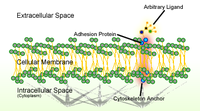
Photo from wikipedia
BackgroundThis prospective, randomized, controlled, single-blinded study investigates the peritoneal adhesion formation of HybridAPC (waterjet elevation of the peritoneum with subsequent argon plasma coagulation) versus only waterjet (elevation with the same… Click to show full abstract
BackgroundThis prospective, randomized, controlled, single-blinded study investigates the peritoneal adhesion formation of HybridAPC (waterjet elevation of the peritoneum with subsequent argon plasma coagulation) versus only waterjet (elevation with the same instrument, but without subsequent argon plasma coagulation) in a rat model (24 female Wistar rats).Materials and methodsBilateral lesions were created on the abdominal wall with HybridAPC on one sidewall and waterjet elevation on the other sidewall of the peritoneum in a standard fashion. After 10 days, the rats were euthanized to evaluate the peritoneal trauma sites.Main outcome measure(s)Adhesion incidence, quantity, and quality were scored 10 days postoperatively and studied histopathologically.Result(s)Incidence of adhesion formation was 2.3% for HybridAPC; no adhesions occurred for peritoneal elevation with saline (p = 1.00). Histologic evaluation revealed no acute inflammation in both groups. An overall moderate degree of granulation tissue formation and myonecrosis was observed in the HybridAPC group, whereas no chronic inflammation and myonecrosis occurred after elevation without thermal ablation (p < 0.0001).Conclusion(s)This study investigates the effect of waterjet elevation of the peritoneum with and without subsequent thermal ablation on adhesion formation in a rat model for the first time. Peritoneal waterjet elevation with saline does not provide any risk of adhesion formation. Thermal coagulation with APC after waterjet elevation of the peritoneum creates advantageous peritoneal conditions due to a permanent moist tissue surface and the cooling effect of the injected solution, resulting in no significant difference in adhesion formation compared to peritoneal elevation without thermal ablation. HybridAPC can thus be regarded as a beneficial coagulation method with only minor adhesion formation due to positive tissue effects of the combined waterjet.
Journal Title: Archives of Gynecology and Obstetrics
Year Published: 2018
Link to full text (if available)
Share on Social Media: Sign Up to like & get
recommendations!